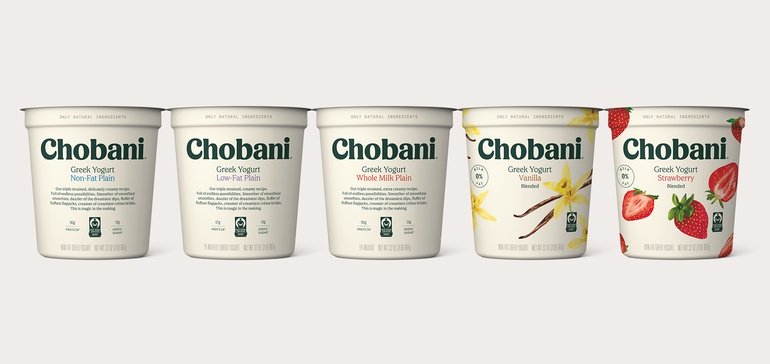Chobani is rolling out a Greek yogurt without sugar as the food maker doubles down on healthier offerings in demand with consumers who are more closely watching what they eat and drink.



Chobani is rolling out a Greek yogurt without sugar as the food maker doubles down on healthier offerings in demand with consumers who are more closely watching what they eat and drink.
The company said Chobani Zero Sugar, shipping to retailers this month, is the first nationally distributed product in the U.S. yogurt aisle that has no trace of sugar. Each serving has 60 calories, uses only natural ingredients, is lactose-free and contains six live and active cultures including probiotics.
“This was a gap in our portfolio. It’s a segment we weren’t competing in directly,” Niel Sandfort, chief innovation officer at Chobani, said of the more than $1 billion diet and reduced sugar yogurt category. “We have very high hopes that it’s going to not just take share, not just premiumize and trade up the consumer, but bring in new consumers who may have walked away from the yogurt set because of sugar.”
To create Chobani Zero Sugar, the Greek yogurt maker used milk that’s been filtered to reduce naturally occurring sugar. Chobani then uses what it calls “cutting-edge” natural fermentation methods that allow yogurt cultures to fully consume the remaining sugar. It then adds monk fruit and allulose to give the yogurt a sweet taste. Chobani Zero Sugar comes in four flavors: Vanilla, Mixed Berry, Strawberry and Blueberry.
Sandfort said Chobani’s no-sugar offering was a “very challenging product” to develop and was subjected to the most amount of testing in the company’s history for a new launch. Unlike other low-calorie, low-sugar options that use artificial ingredients and create an off-putting flavor, Sandfort said Chobani stuck to its mantra by using only natural ingredients.
“We didn’t walk away from any of the things we believe in,” he said. “To get to [zero sugar] there’s lots of easy ways to do that. And there’s only one really hard way, which is doing it naturally through fermentation.”
The food maker has “been on this path” to no sugar for much of its history, Sandfort said. When Chobani debuted, its yogurt had fewer than 15 grams of sugar compared to the 30 or 40 grams in its competitors’ products. It has since launched a reduced-sugar yogurt and a zero-sugar oat milk.
Chobani established its dominance in the Greek yogurt space not long after it launched. But in recent years, it has moved aggressively to tailor its product portfolio to cater to many of the hot trends in the food space. Chobani launched a probiotic yogurt line in January and last summer introduced its protein-laden Chobani Complete. In late 2019, Chobani made its first foray into plant-based dairy with Non-Dairy Chobani made from coconuts.
“We are consciously being more overt with the functionality of the food,” Sandfort said.
The New York-based Chobani has not only focused its innovation prowess in dairy but also ventured outside the category with the launch of cold brew coffees.
The suite of new product launches should help Chobani expand its presence in grocery stores and increase its revenue, which totals more than $1.5 billion annually.
The sales growth would undoubtedly be looked upon favorably by perspective investors as Chobani is reportedly considering an IPO later in 2021. The Wall Street Journal reported in February Chobani is looking at a listing that it hopes would value the company at $7 billion to $10 billion.
Chobani’s latest product roll out comes as the company further expands its presence in the yogurt category. In the last 52 weeks ended May 29, total yogurt sales have increased 2.5% as the category benefited from people spending more time at home snacking, while Chobani’s growth during the same period was 7.4%, according to Nielsen U.S food channels data shared by the company.
Chobani’s Zero Sugar offering will further intensify pressure in the ultra-competitive yogurt space, where companies have been racing to lower the sugar content of their products.
General Mills has introduced YQ by Yoplait where the plain variety has one gram of sugar, and the flavored options have 9 grams. In April, the food manufacturer introduced a high-protein yogurt to its keto-friendly Ratio product line that contains 3 grams of sugar. It joins the original line of Ratio yogurts, which contain 15 grams of protein and 1 gram of sugar per serving.
Dairy and plant-based food giant Danone boosted its presence in the low-sugar space with the introduction of Two Good, a Greek low-fat yogurt with two grams of sugar, in 2019. The offering from the French company has proven to be a hit. Sales more than doubled in 2020, and the brand posted $111 million in revenue during its first 16 months on the market, according to Danone.
Follow Christopher Doering on Twitter
Legal notice about Intellectual Property in digital contents. All information contained in these pages that is NOT owned by eDairy News and is NOT considered “public domain” by legal regulations, are registered trademarks of their respective owners and recognized by our company as such. The publication on the eDairy News website is made for the purpose of gathering information, respecting the rules contained in the Berne Convention for the Protection of Literary and Artistic Works; in Law 11.723 and other applicable rules. Any claim arising from the information contained in the eDairy News website shall be subject to the jurisdiction of the Ordinary Courts of the First Judicial District of the Province of Córdoba, Argentina, with seat in the City of Córdoba, excluding any other jurisdiction, including the Federal.
1.
2.
3.
4.
5.
eDairy News Spanish
eDairy News PORTUGUESE
